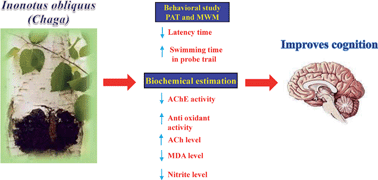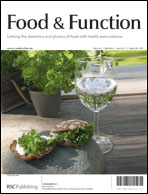The present study was aimed to investigate the cognitive enhancing and anti-oxidant activities of Inonotus obliquus (Chaga) against scopolamine-induced experimental amnesia. Methanolic extract of Chaga (MEC) at 50 and 100 mg kg −1doses were administered orally for 7 days to amnesic mice. Learning and memory was assessed by passive avoidance task (PAT) and Morris water maze (MWM) test. Tacrine (THA, 10 mg kg −1, orally (p.o)) used as a reference drug. To elucidate the mechanism of the cognitive enhancing activity of MEC, the activities of acetylcholinesterase (AChE), anti-oxidant enzymes, the levels of acetylcholine (ACh) and nitrite of mice brain homogenates were evaluated. MEC treatment for 7 days significantly improved the learning and memory as measured by PAT and MWM paradigms. Further, MEC significantly reduced the oxidative-nitritive stress, as evidenced by a decrease in malondialdehyde and nitrite levels and restored the glutathione and superoxide dismutase levels in a dose dependent manner. In addition, MEC treatment significantly decreased the AChE activity in both the salt and detergent-soluble fraction of brain homogenates. Further, treatment with MEC restored the levels of ACh as did THA. Thus, the significant cognitive enhancement observed in mice after MEC administration is closely related to higher brain anti-oxidant properties and inhibition of AChE activity. These findings stress the critical impact of Chaga, a medicinal mushroom, on the higher brain functions like learning and memory.

You have access to this article
 Please wait while we load your content...
Something went wrong. Try again?
Please wait while we load your content...
Something went wrong. Try again?


 Please wait while we load your content...
Please wait while we load your content...